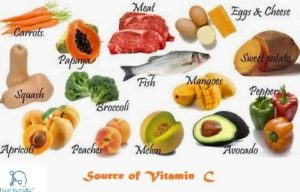Vitamin C: Vitamin C, which is also known as L-ascorbic acid, is a water-soluble vitamin that is naturally present in some foods or added as a supplement. Human, unlike most animals, is unable to synthesize vitamin C endogenously, so it is an essential dietary component.

Recommended dietary allowance of vitamin C
- 0-12 months -> 40-50 mg
- 1-8 years -> 15-25 mg
- 9-13 years -> 45 mg
- 14-18 years -> 65-75 mg
- 19+ years -> 75-90 mg
- Pregnancy -> 80-85 mg
- Lactation -> 120 mg.

You Might Also Like:
- Gum Disease: Symptom, Causes, Home Remedies & Treatment
- Red Meats: Benefits, Adverse effect & Daily Allowances
- Protein: Healthiest Sources, Daily Requirements & Adverse effect
Sources of vitamin C
- Red pepper, orange, grapefruit, kiwi, green pepper, broccoli, strawberries, Brussels sprouts, tomato, juice, cantaloupe, cabbage, cauliflower, spinach, green peas.
- Supplement as vitamin C tablets.

Importance of vitamin C:
- It works as an antioxidant for the body.
- It prevents age-related muscular degeneration.
- It cures cataracts and the common cold.
- It helps in cancer prevention.
- It helps in infection prevention.
- It is required for biosynthesis of collagen
- It helps in protein metabolism
- It improves the absorption of nonheme iron.

Health Benefits Of Vitamin C
- Prevention of Scurvy
- Cure of Lead Toxicity
- Curing Cataracts (Eye Disorder)
- Treatment of the Common Cold
- Lowering Hypertension
- Treatment of Cancer
- Wound Repair
- Controlling Asthma
- Preventing Heart Diseases
- Boost up Immunity
Deficiency Syndrome of vitamin C
- Scurvy (fatigue or lassitude)
- Widespread connective tissue weakness
- Capillary fragility

